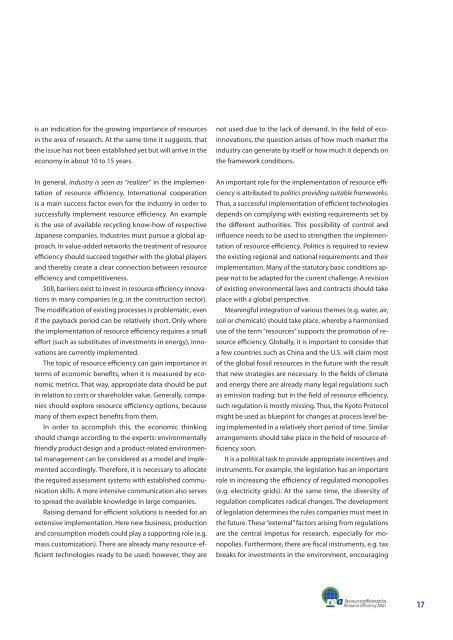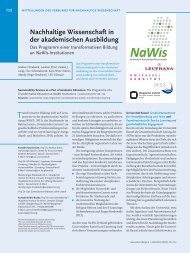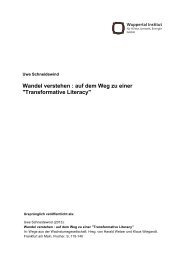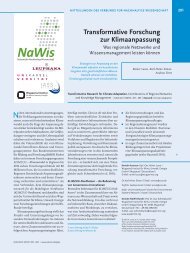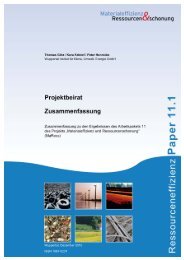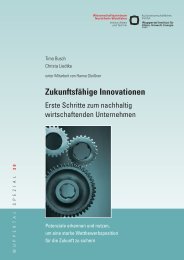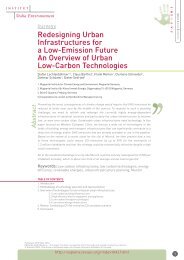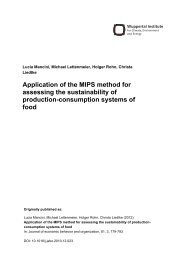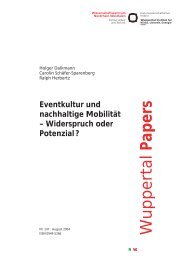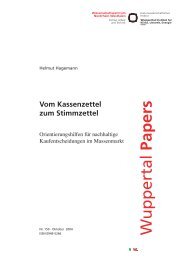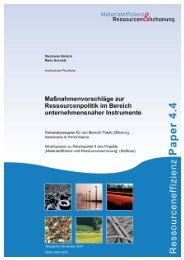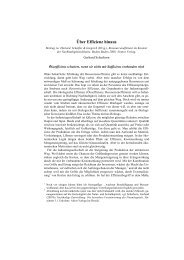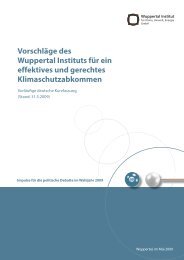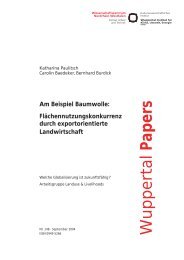Resource Efficiency Atlas - Publication Server of the Wuppertal ...
Resource Efficiency Atlas - Publication Server of the Wuppertal ...
Resource Efficiency Atlas - Publication Server of the Wuppertal ...
You also want an ePaper? Increase the reach of your titles
YUMPU automatically turns print PDFs into web optimized ePapers that Google loves.
is an indication for <strong>the</strong> growing importance <strong>of</strong> resources<br />
in <strong>the</strong> area <strong>of</strong> research. At <strong>the</strong> same time it suggests, that<br />
<strong>the</strong> issue has not been established yet but will arrive in <strong>the</strong><br />
economy in about 10 to 15 years.<br />
In general, industry is seen as “realizer” in <strong>the</strong> implementation<br />
<strong>of</strong> resource efficiency. International cooperation<br />
is a main success factor even for <strong>the</strong> industry in order to<br />
successfully implement resource efficiency. An example<br />
is <strong>the</strong> use <strong>of</strong> available recycling know-how <strong>of</strong> respective<br />
Japanese companies. Industries must pursue a global approach.<br />
In value-added networks <strong>the</strong> treatment <strong>of</strong> resource<br />
efficiency should succeed toge<strong>the</strong>r with <strong>the</strong> global players<br />
and <strong>the</strong>reby create a clear connection between resource<br />
efficiency and competitiveness.<br />
Still, barriers exist to invest in resource efficiency innovations<br />
in many companies (e.g. in <strong>the</strong> construction sector).<br />
The modification <strong>of</strong> existing processes is problematic, even<br />
if <strong>the</strong> payback period can be relatively short. Only where<br />
<strong>the</strong> implementation <strong>of</strong> resource efficiency requires a small<br />
effort (such as substitutes <strong>of</strong> investments in energy), innovations<br />
are currently implemented.<br />
The topic <strong>of</strong> resource efficiency can gain importance in<br />
terms <strong>of</strong> economic benefits, when it is measured by economic<br />
metrics. That way, appropriate data should be put<br />
in relation to costs or shareholder value. Generally, companies<br />
should explore resource efficiency options, because<br />
many <strong>of</strong> <strong>the</strong>m expect benefits from <strong>the</strong>m.<br />
In order to accomplish this, <strong>the</strong> economic thinking<br />
should change according to <strong>the</strong> experts: environmentally<br />
friendly product design and a product-related environmental<br />
management can be considered as a model and implemented<br />
accordingly. Therefore, it is necessary to allocate<br />
<strong>the</strong> required assessment systems with established communication<br />
skills. A more intensive communication also serves<br />
to spread <strong>the</strong> available knowledge in large companies.<br />
Raising demand for efficient solutions is needed for an<br />
extensive implementation. Here new business, production<br />
and consumption models could play a supporting role (e.g.<br />
mass customization). There are already many resource-efficient<br />
technologies ready to be used; however, <strong>the</strong>y are<br />
not used due to <strong>the</strong> lack <strong>of</strong> demand. In <strong>the</strong> field <strong>of</strong> eco-<br />
innovations, <strong>the</strong> question arises <strong>of</strong> how much market <strong>the</strong><br />
industry can generate by itself or how much it depends on<br />
<strong>the</strong> framework conditions.<br />
An important role for <strong>the</strong> implementation <strong>of</strong> resource efficiency<br />
is attributed to politics providing suitable frameworks.<br />
Thus, a successful implementation <strong>of</strong> efficient technologies<br />
depends on complying with existing requirements set by<br />
<strong>the</strong> different authorities. This possibility <strong>of</strong> control and<br />
influence needs to be used to streng<strong>the</strong>n <strong>the</strong> implemen-<br />
tation <strong>of</strong> resource efficiency. Politics is required to review<br />
<strong>the</strong> existing regional and national requirements and <strong>the</strong>ir<br />
implementation. Many <strong>of</strong> <strong>the</strong> statutory basic conditions ap-<br />
pear not to be adapted for <strong>the</strong> current challenge. A revision<br />
<strong>of</strong> existing environmental laws and contracts should take<br />
place with a global perspective.<br />
Meaningful integration <strong>of</strong> various <strong>the</strong>mes (e.g. water, air,<br />
soil or chemicals) should take place, whereby a harmonised<br />
use <strong>of</strong> <strong>the</strong> term “resources” supports <strong>the</strong> promotion <strong>of</strong> re-<br />
source efficiency. Globally, it is important to consider that<br />
a few countries such as China and <strong>the</strong> U.S. will claim most<br />
<strong>of</strong> <strong>the</strong> global fossil resources in <strong>the</strong> future with <strong>the</strong> result<br />
that new strategies are necessary. In <strong>the</strong> fields <strong>of</strong> climate<br />
and energy <strong>the</strong>re are already many legal regulations such<br />
as emission trading; but in <strong>the</strong> field <strong>of</strong> resource efficiency,<br />
such regulation is mostly missing. Thus, <strong>the</strong> Kyoto Protocol<br />
might be used as blueprint for changes at process level being<br />
implemented in a relatively short period <strong>of</strong> time. Similar<br />
arrangements should take place in <strong>the</strong> field <strong>of</strong> resource efficiency<br />
soon.<br />
It is a political task to provide appropriate incentives and<br />
instruments. For example, <strong>the</strong> legislation has an important<br />
role in increasing <strong>the</strong> efficiency <strong>of</strong> regulated monopolies<br />
(e.g. electricity grids). At <strong>the</strong> same time, <strong>the</strong> diversity <strong>of</strong><br />
regulation complicates radical changes. The development<br />
<strong>of</strong> legislation determines <strong>the</strong> rules companies must meet in<br />
<strong>the</strong> future. These “external” factors arising from regulations<br />
are <strong>the</strong> central impetus for research, especially for monopolies.<br />
Fur<strong>the</strong>rmore, <strong>the</strong>re are fiscal instruments, e.g. tax<br />
breaks for investments in <strong>the</strong> environment, encouraging<br />
Ressourceneffizienzatlas<br />
<strong>Resource</strong> <strong>Efficiency</strong> <strong>Atlas</strong> 17


